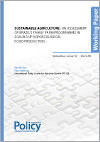Land Grab in Africa: A Review of Emerging Issues and Implications for Policy Options
Abstract:The intensity and magnitude of large-scale land acquisition in Africa over the past decade is putting severe pressure on the demand for land and the quality of land available for less powerful users. The most heavily targeted countries are DRC, Ethiopia, Madagascar, Mozambique, Sudan, Tanzania and Zambia. There appears to be some divergence of interest between Africans and foreign investors in the demand for African land. African governments’ use of land as a commodity is shaped by their quest to transform the agricultural sector with a view to raising productivity, increasing food supply, reducing poverty and expanding livelihoods. However, the motivation for most foreign investors includes investing in countries’ food supply chains and security, meeting demand for bio-fuels, mineral resource exploration etc. The exportation of almost all food produced to investors’ countries, and non-implementation of agreed contracts, including compensation for displaced people, among other issues, tend to confirm this divergence of objectives and the dichotomies it creates between intentions and reality. (…)
This publication can also be founded in a condensed and/or expanded format:
